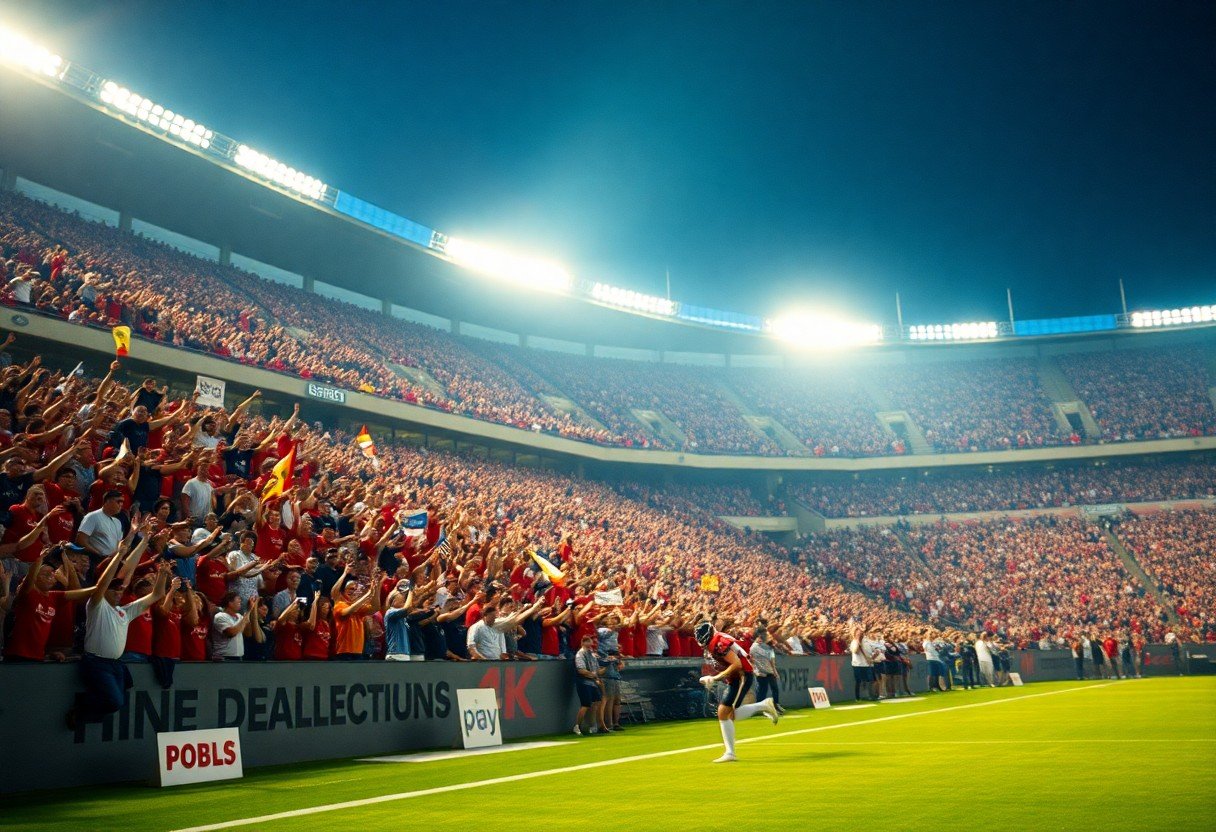Most people experience a profound emotional connection at sporting events, where intense competition meets the thrill of victory and the agony of defeat. These moments can create lasting memories that resonate deeply with both fans and athletes. You may find yourself immersed in the pageantry, adrenaline, and camaraderie that sporting events provide, sparking a feeling of euphoria that elevates your appreciation for the game. This post explores how these experiences can contribute not only to your enjoyment but also to a greater understanding of the powerful impact sports have on our lives.
The Concept of the Sublime in Sports
Before delving into sports, it is vital to grasp how the sublime manifests within this dynamic field. The sublime experience in sports can encapsulate overwhelming emotions, transcendental moments, and a heightened sense of connection to both athletes and fellow spectators. This unique phenomenon encourages you to revel in the sheer beauty of movement, resilience, and the triumph of human spirit.
Historical Perspectives
About the historical context of the sublime in sports, you should acknowledge how ancient civilizations revered athletic contests as grand displays of human potential. Events like the Olympic Games in Ancient Greece were seen as sacred, where victory signified both personal and communal excellence, fostering a sense of awe that resonates even today.
Definitions and Interpretations
Interpretations of the sublime in sports vary, yet they all converge on experiences that evoke profound emotional responses in you. These experiences are often characterized by a blend of beauty, terror, and an overwhelming sense of wonder, which can elevate ordinary moments to extraordinary heights.
Also, it’s key to note that the idea of the sublime can encapsulate moments of intensity and grandeur in sports, leading to deep personal revelations and connections. The capacity of a sporting event to merge joy, fear, and a sense of collective achievement fosters a unique atmosphere where you may find yourself emotionally engaged. This engagement often blurs the lines between spectator and participant, offering experiences that can bemuse, thrill, and inspire.
The Psychological Impact of Sporting Events
You may not realize it, but sporting events profoundly affect your mental state, shaping your emotions, ideas, and sense of identity. These gatherings can create an atmosphere of excitement and tension, allowing you as a fan to connect deeply with the sport, players, and fellow spectators. This psychological transformation can lead to lasting effects, reinforcing social bonds and enhancing your overall sense of well-being.
Emotions and Fan Engagement
The thrill of cheering for your team can evoke powerful emotions and a sense of belonging. As a fan, your engagement goes beyond mere observation; it involves investing your time, energy, and passion, leading to intense feelings of joy or heartbreak. These emotional highs and lows make the experience of watching sporting events truly unique, often blurring the lines between personal identity and team affiliation.
Athletes’ Experiences of Awe
Before stepping onto the field, athletes often encounter moments that inspire a sense of awe within them. The pressure of performing in front of thousands can lead to heightened sensitivity to their surroundings, making their experiences more profound.
Emotions play a vital role in athletes’ experiences of awe, as they navigate the exhilarating highs of victory and the devastating lows of defeat. Moments of triumph can elicit an overwhelming sense of connection to the crowd, reinforcing their drive and purpose. Conversely, facing challenges and setbacks can foster resilience, pushing them to overcome adversity. The adrenaline rush from competition, coupled with recognition from fans, ultimately leads to growth and development both on and off the field, highlighting the transformative power of sport in the lives of these individuals.
The Role of Community and Shared Experience
Some may overlook the powerful bond that forms in the shared experience of sporting events. The excitement and anticipation resonate within a community, creating a sense of belonging and unity. As fans come together to cheer for their team, they establish connections that transcend individual differences, solidifying relationships forged by a mutual passion for the sport.
Fostering Connection Among Fans
Any sporting event provides a unique venue for fans to connect, share stories, and celebrate victories together. Engaging in lively discussions, competing in friendly banter, or even sharing in the pain of a loss fosters a deep bond among supporters. These interactions enrich your experience, elevating the atmosphere and making every game feel like a collective journey.
The Athlete-Fan Relationship
Relationship dynamics between athletes and fans can profoundly influence the sporting experience. When you connect with an athlete, whether through social media or in-person encounters, it deepens your investment in their journey. But this relationship can be two-sided. Athletes often rely on fan support to fuel their performance, enhancing their drive to succeed. In many cases, the emotional support from dedicated fans can become a source of motivation, while athletes’ successes and struggles unite you in ways that foster community and empathy.
The Aesthetic Dimensions of Sport
Many fans and athletes alike find that the aesthetic qualities of sport offer a deeper connection to the experience. From the graceful movements of a dancer on ice to the precision of a well-executed play in football, the beauty inherent in athletic performance can evoke powerful emotions. The artistry involved in skillful maneuvers enriches the overall atmosphere of sporting events, turning them into captivating displays that transcend mere competition.
Beauty in Performance
To appreciate the beauty in athletic performance, you must observe the seamless blend of strength, agility, and precision. Each movement speaks of the dedication and artistry that athletes develop through years of hard work and practice. Whether it’s a gymnast executing a perfect routine or a sprinter gliding effortlessly down the track, you can witness the form, rhythm, and elegance that unfolds before your eyes, creating a mesmerizing spectacle.
The Role of Visualization and Anticipation
To truly grasp the importance of visualization and anticipation in sport, you need to understand how these mental practices can enhance performance. Athletes often visualize their routines or plays, which helps them prepare for the physical demands ahead. This process not only boosts confidence but also sharpens your focus, allowing you to anticipate the unfolding dynamics of the game or performance.
Due to the power of visualization, athletes can enhance their preparation and performance significantly. This mental imagery fosters a heightened state of confidence and allows you to mentally simulate the challenges that lie ahead. Furthermore, the anticipation involved in waiting for a crucial moment can elevate your emotional experience during a competition. It enhances your overall engagement, drawing you into the action and allowing you to feel every flicker of nervous energy that accompanies upcoming events. The combination of visualization and anticipation creates a compelling narrative that heightens the emotional stakes for both participants and spectators alike.

Case Studies: Moments of Sublimity in Sports
After analyzing various iconic sporting moments, it’s clear that certain events have transcended the ordinary, providing fans and athletes with experiences of sublime intensity. Here are notable case studies:
- 1999 UEFA Champions League Final: Manchester United’s two injury-time goals, securing a dramatic comeback against Bayern Munich.
- Michael Phelps’ 2008 Olympics: Achieving eight gold medals in a single Games, establishing a record that still stands.
- Usain Bolt’s 2008 Beijing Olympics: A world record of 9.69 seconds in the 100 meters, showcasing unmatched athleticism.
- NBA Finals 2016: The Cleveland Cavaliers’ historic comeback from a 3-1 deficit against the Golden State Warriors.
Legendary Events and Performances
Moments like Michael Jordan’s last shot in 1998 or the infamous “Miracle on Ice” in 1980 showcase how performances can transcend typical sports narratives, leading to unforgettable experiences for all involved.
Personal Narratives from Fans and Athletes
After witnessing a sporting event that challenges the boundaries of human performance, your connection to the moment can be deeply personal. Fans report feelings of elation, pride, and unity with players and other spectators in exhilarating games.
Considering these narratives, the emotions expressed can be profound. Fans often recount the collective gasps and cheers, as well as the intense camaraderie shared during decisive moments. Athletes speak of adrenaline surges and the pressure that brings them closer to their limits. Personal stories add a rich layer to the discussion about the transformative power of sports, illustrating both the joy and dedication inherent to these sublime experiences.

Challenges to Sublime Experiences
For many, the pursuit of a sublime experience in sports can be hindered by several challenges. The complexities surrounding the emotional highs and lows that fans and athletes experience can sometimes detract from their enjoyment (Just a Game? Sport and Psychoanalytic Theory). Various external factors can cloud your ability to fully immerse yourself in the moment, emphasizing the importance of addressing these hurdles.
Commercialization and Consumerism
Beside the intrinsic beauty of sports, the overwhelming influence of commercialization and consumerism can diminish your experience. As events are increasingly marketed and commercialized, the focus shifts from genuine passion to profit, making it harder for both fans and athletes to connect deeply with the sport.
The Pressure of Competition
About the nature of competitive sports, the immense pressure to perform can create a barrier to achieving sublime experiences. This pressure often manifests as anxiety and stress, affecting your enjoyment and appreciation of the sport. As athletes grapple with expectations from fans, coaches, and sponsors, the purity of the competition can be overshadowed.
Consumerism plays a significant role in shaping your experience of sporting events. While it can provide access to more amenities and entertainment, it can also create a sense of dissatisfaction. The relentless pursuit of profit emphasizes spectacle over authenticity, distracting you from the profound moments that make sports special. Additionally, the pressure to succeed pushes athletes towards an unhealthy mindset, ofte leading to burnout and a loss of passion. To truly embrace the sublime aspects of sports, you must navigate these influences and focus on the elements that resonate with your love for the game.
Final Words
Drawing together the threads of your experience as a fan or athlete, it’s clear that sporting events can indeed provoke a sublime experience, enriching your emotional landscape. The blend of adrenaline, camaraderie, and the sheer unpredictability of competition can elevate moments into something truly extraordinary. Whether you’re cheering in the stands or competing on the field, the connection to the sport and the community around it can lead to unforgettable memories and profound moments of transcendence. Thus, embracing these experiences can help you appreciate the beauty and excitement that sports uniquely offer.









